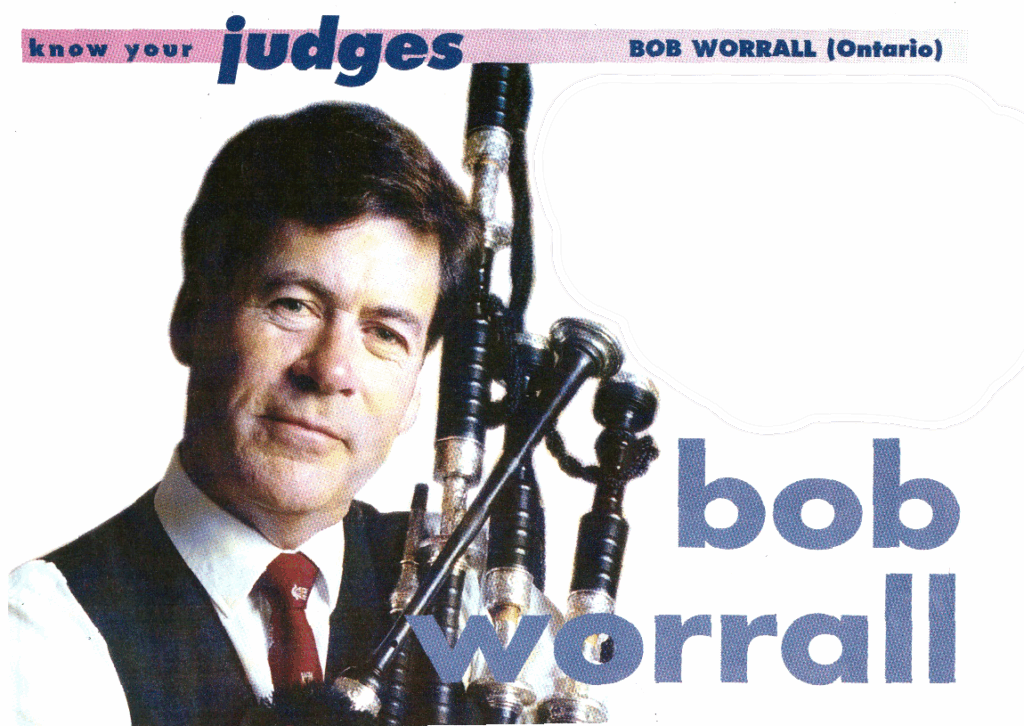
Twenty five years ago Pipe Band Magazine began a series of interviews with pipe band judges. The first, in January 2000, was with Canadian Bob Worrall. This is the second instalment of the the interview with Bob. Read the first here. Despite the passage of time, many of Bob’s views remain valid and topical today…….
Which bands have been your greatest influence?
Strathclyde Police and Muirheads.
Best band performance you have heard?
Victoria Police in the Medley event at the Worlds in 1997. The unison, musicality and tone were virtually flawless.
What are you looking for from a pipe band?
My pecking order is definitely 1 Musicality 2 Technique 3 Tone. In a competition, if the performances were, in my opinion, almost equal, that is how I would go about sorting out a list. However, without question, in performances where minor differences exist in musicality or technique, but a major difference jumps out in tonal quality, it would then fall upon tone to determine the prize list. It’s not an easy thing to say where your priorities lie. It depends on a number of other variables.
What do you think of the style of music played today?
I think that many medleys have fallen into a well-defined format. They are, in many cases, not what the medley concept was meant to be. Many are highly predictable in their structure. That would be the one barrier I would like to see more bands trying to overcome. The 78th and the Vale have taken those risks. Sometimes those risks have not been rewarded. I would like to see much more discussion on the flexibility of the musical envelope in medleys. My eyes were opened wide after experiencing the Grade 1 bagad competition in Lorient this past summer. I do feel that many of our bands could learn a great deal from this experience. The Bretons have done much more to encourage a liberal approach to the structure of the medley.
Are we losing the MSR?
I may be in the left field on this one. I know that conventional thinking by many is that we are losing musicality on the MSR. However, I would disagree. I think that for many years we heard outstanding music from Muirheads, and then in latter years from Strathclyde Police. Many would argue that these bands were almost in a league of their own in these events. My feeling is that today there are several bands who consistently produce extremely high quality music in the MSR. The leadership of more and more of these bands is in the hands of highly accomplished soloists. Their solo expertise is being reflected in the MSRs we are hearing on the field. So, in short, I don’t see one band dominating this event like may have been the case ten years ago. And maybe none are producing the consistency of a Strathclyde Police MSR. However the overall Grade 1 MSR quality, in my opinion, has gone up.
Are drummers important?
Without question. The role of an effective mid-section can make or break a band performance. Undoubtedly a snare section which places ensemble as the priority gives any band a huge advantage. Complementary beatings and rhythms from the snare and mid-sections can be phenomenally conducive to excellence in unison within the pipe corps. My concern is with the situation where a snare section does dominate. I believe that associations need to question the validity of awarding separate awards to drum sections. I am not convinced that this encourages the kind of band performances we are looking for.
Why should bands trust you?
I know I work extremely hard at trying to balance all components when conducting my evaluation of a band’s performance, and when evaluating it vis-à-vis all other performances in the event. It is the relative placement of a band that is the difficult part of the job. I try not to get too caught up in one or two specifically negative details. That can deter you from truly hearing the overall package. It’s not easy. But I do think that this is something that, over the years, I have become pretty skilled at. I think I am an extremely analytical adjudicator. It all comes down to fairness. I really believe that every time we prepare to evaluate a performance, as another band waits at the line, we need to remember the amount of collective musical energy that has gone into the performance that we are about to hear. In addition, the personal and financial sacrifice that all of these bands have made in order to make it to the line is phenomenal. As long as we keep reminding ourselves of these factors, I think we go into every performance with an open mind.
- Read the first part of this interview here.
‘Highland Bagpipe Music’ by Donald Morrison – digital book
This book was first produced shortly before Donald died in 1988. Languishing out of print, it surfaced in 2021 following contact between Piping Press editor Robert Wallace and Donald’s daughter Sheona. Sheona agreed that it should be offered to the piping public once more at nominal cost, the aim being to preserve her father’s musical legacy. Donald Morrison was the complete piper a fine teache…